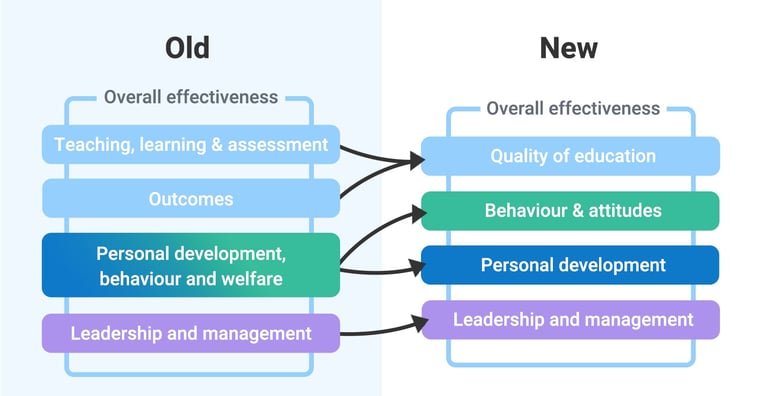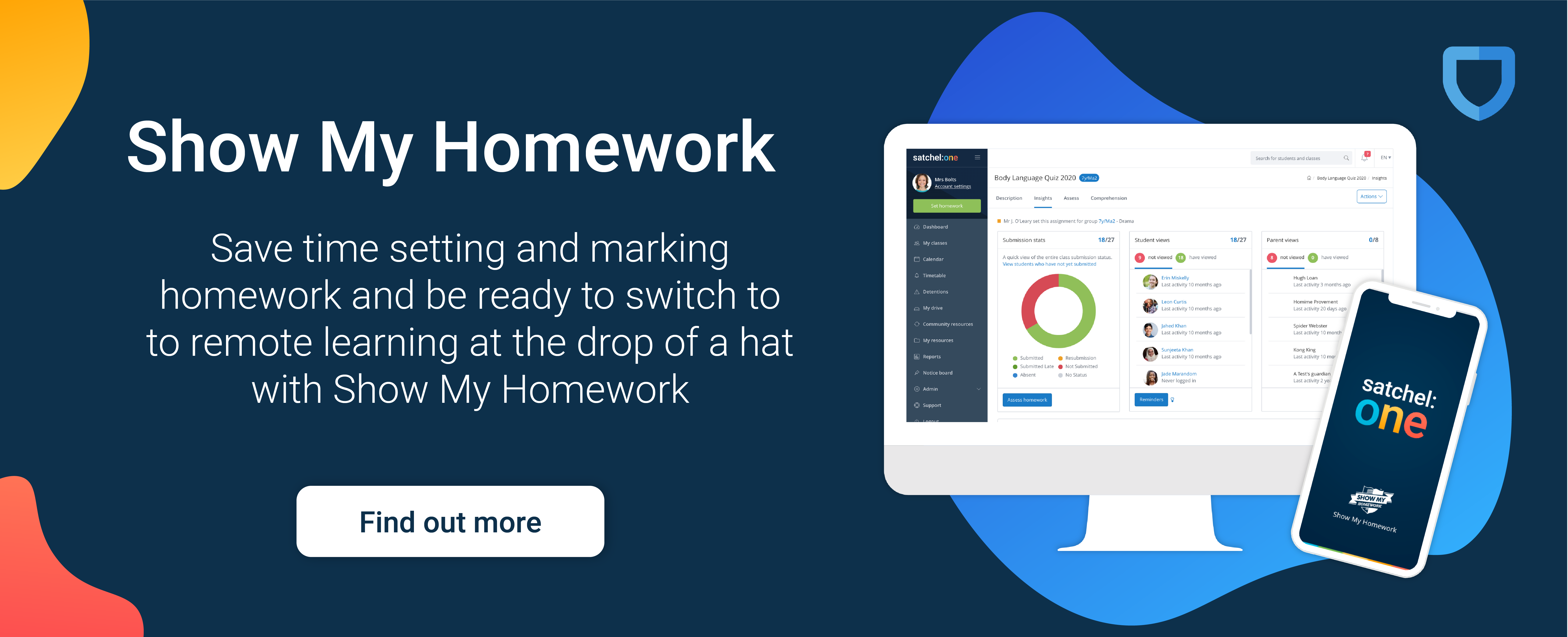Author: Bethany Spencer
Posted: 04 Nov 2019
Estimated time to read: 6 mins
In September 2019, Ofsted’s new inspection framework came into effect for schools across the UK. This new framework was introduced in a bid to address areas of concern that schools have had for years surrounding inspection, relating to workload, wellbeing and data management as well as "re-focus[ing] inspections on the real substance of education - the curriculum".
The shift in focus supports a more holistic approach to education, one that is reflective of a teacher’s real job role and measures success outside of exam results. This blog will explore the biggest changes facing the new education inspection framework (EIF) and what they mean for schools.
Before we assess these changes, there are a few things that schools need to know:
- There will be a transition period allowed for schools inspected during the first year of the framework to accommodate for the change.
- The four point grading system will remain the same and at the end of inspection school will receive a grade of Inadequate, Requires Improvement, Good or Outstanding.
- In order for a school to be rated Outstanding they must hit all requirements of Good before they can be considered for the Outstanding rating.
Change 1: New judgement - quality of education
Perhaps the biggest change to the new framework is the introduction of the new judgement - quality of education. This new judgement combines the teaching, learning & assessment and outcomes judgements that were present under the previous EIF.

So, what does this change mean?
By removing the outcomes judgement, schools no longer have to worry about being data-driven and obsessed with providing numbers to Ofsted that ‘prove’ their success. Instead, the merging of this judgement with Teaching, learning and assessment creates a key judgement that puts the curriculum back at the centre of education: Quality of education. Under this new judgement, schools will be assessed following the intent, implementation and impact of the curriculum and what knowledge and skills students are taught.
- Intent: The knowledge and skills pupils will gain
- Implementation: How the curriculum is taught and assessed
- Impact: Student outcomes and information retention
Change 2: Behaviour and personal development are judged separately
The second biggest change in the new EIF is that behaviour and personal development are now judged separately; before September 2019, these judgements were inspected under the single behaviour, development and welfare category.
Behaviours and attitudes
- Considers pupil attendance, punctuality and exclusions
- Takes into consideration the school environment: can students learn in the given setting is there a positive culture where staff and students respect one another?
- Ensures students’ attitudes to learning are positive and they are ready and willing to learn
- Includes bullying, discrimination and abuse and ensures there’s a zero tolerance approach to this
Personal development
- Considers how well the curriculum develops learners outside of academic, technical or vocational skills
- Whether or not students are encouraged to develop and discover their interests and skills
- Takes into consideration character development as well as students’ physical and mental health as well as relationships and sex education
- Constantly provides students with advice for future success
- Ensures students are prepared for life in modern day Britain - teaching them how to be respectable citizens, an understanding of British values, appreciation of diversity and respect of everyone
So, what does this mean?
This change highlights how Ofsted are more concerned about student behaviour and their development and recognises that more attention needs to be paid to these areas to ensure students’ success. In addition, it acknowledges the importance of a curriculum that develops students' academic skills as well as their character in order for them to become respected, successful citizens.
The role of a teacher has transformed over time. As such, today's teachers have a duty to teach students curriculum knowledge and the information they need to become outstanding members of society - equipping them with the knowledge required to excel outside of education and lead a safe, happy and successful life.

Change 3: The inspection of Good schools will take two days
Another substantial change under the new framework is that the inspection of schools rated Good will now take two days. Under the old framework, these inspections only took a single day.
So, what does this mean?
The reason for this change, as stated by Ofsted, is to ensure that there is substantial time to gather evidence around whether or not a school should retain their Good rating. This is especially pertinent now because of the new criteria and inspectors needing a reasonable amount of time to assess whether or not schools rated Good under the old framework are considered Good under the new one.
This provides Ofsted with ample time to assess schools, and arguably, provides schools with enough time to prove their Good status under the new criteria. Inspectors will still have the opportunity to upgrade the inspection if they feel a school has gotten better or worse since their last inspection.
Change 4: Longer, 90 minute initial phone call with lead inspector
As part of the new framework, the Headteacher will receive a phone call from the lead inspector that will last up to 90 minutes on the afternoon before the inspection takes place. This was introduced after initial plans to introduce an on-site preparation meeting were scrapped.
So, what does this mean?
A school’s inspection will start from the moment the Headteacher and lead inspector are on the phone call. The phone call itself will set the tone for when inspectors arrive and will provide both parties with an opportunity to start building positive working relationships, for professional dialogue to begin and to discuss logistics and timetables for the inspection. The phone call is also likely to include a reflective conversation on progress since the last inspection.
Top tips:
- Use this as an opportunity to sell you school
- The conversation can be split up into two separate discussions if you wish
- As the Headteacher, ensure someone else answers the phone and then call the inspector back to allow yourself a couple of minutes to prepare
- Feel free to have an additional member of staff present during the phone call to highlight how your school works as a team and visions are aligned

Change 5: No use of internal pupil performance data
The fifth change addresses the debate around the role performance data plays in inspections and how it can divert focus from what students are learning and why. To help put the focus back on the curriculum, Ofsted have now removed the outcomes section that existed under the old framework and will no longer use internal pupil assessment data but instead nationally collected assessment data.
So, what does this mean?
Technically, this shift should help reduce workloads and pressure on students and teachers as schools no longer need to carry out an internal assessment. Additionally, it supports Ofsted’s vision of putting the curriculum at the heart of education and judging progress outside of assessment data. Schools are still allowed to collect data, but they should be prepared to explain why they are collecting such data and how it informs teaching and learning.
Ofsted will use the intent, implementation and impact model to help assess progress under the new quality of education judgement. However, due to the lack of emphasis on internal data, schools should think of different ways to prove progress, such as stakeholders’ views and alignment, SEFs, SIPs, curriculum and quality of teaching.
Generally speaking, the changes Ofsted have made to the EIF are positive. They do a better job of representing the true role of a teacher, and by placing emphasis on the curriculum, they should successfully turn schools’ main focus to education, teaching and learning, not exams.
We hope that the new framework nurtures schools’ missions of developing a holistic curriculum that develops thoughtful, independent, knowledgeable and successful citizens.


